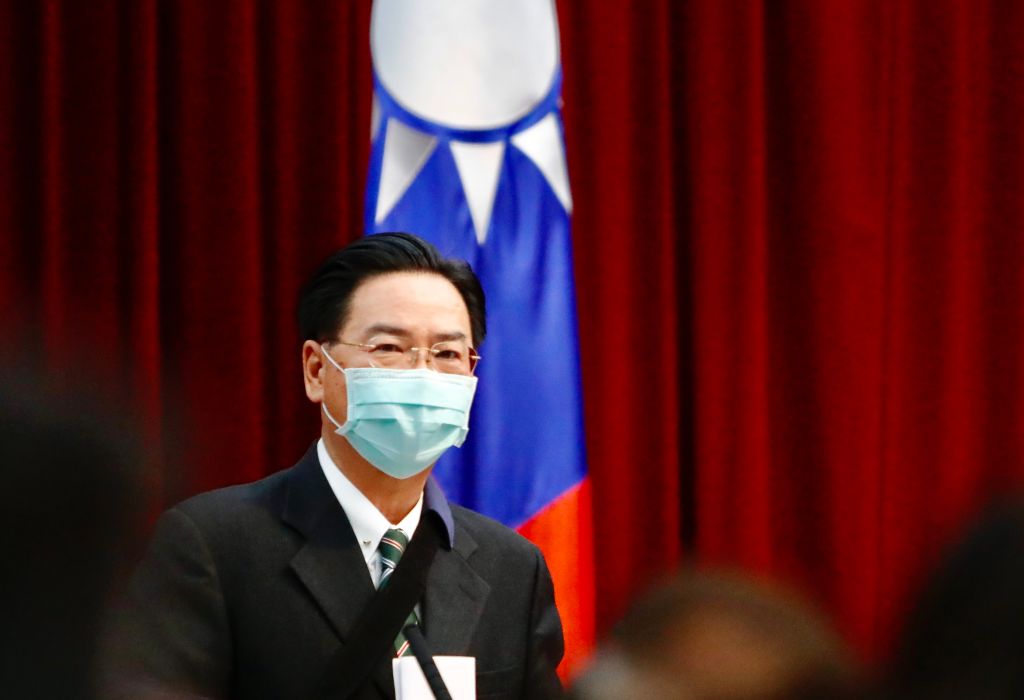
‘Serving as minister of foreign affairs is not an easy task,’ said Joseph Wu, Taiwan’s foreign minister, in conversation with ASPI Executive Director Peter Jennings. ‘Somebody joked that the president must dislike me very much to put me in this position.’
Wu expects his job to get even more difficult over the next year as China continues to intensify pressure against Taiwan on a range of military, economic and diplomatic fronts.
The military pressure is certainly growing more palpable. ‘If you look at the types of military exercises they’ve been conducting, it’s becoming more complex, more suited for modern warfare, and more threatening than ever,’ said Wu. ‘Chinese air exercises around Taiwan increased to almost 1,000 sorties in the last year.’
China has also chalked up some wins in its ongoing efforts to isolate Taiwan diplomatically, with Kiribati, Solomon Islands, Panama and Honduras recently switching their diplomatic recognition from Taipei to Beijing.
And, like Australia, Taiwan has been on the receiving end of Chinese embargoes on its agricultural products.
But a new phase in Beijing’s Taiwan campaign has recently seen it moving to sanction countries that support Taiwan.
‘I’m sure Australian friends have noticed the case of Lithuania. The Lithuanian government decided to have some relations with Taiwan by allowing Taiwan to open up a representative office in Vilnius. The way the Chinese are putting pressure on that small country in the Baltic—it’s unbelievable’.
But that’s not the end point, said Wu. ‘China is targeting European corporations doing business in Lithuania. This is a secondary sanction. Now, the European countries realise that it is a very hostile act against the EU, not just against Lithuania.’
Given the hostility that such moves are generating against China, Wu said that he remained confused about Beijing’s end game. ‘Sometimes I wish that I worked in Zhongnanhai in order to understand why they would do all this, because it’s not in line with their interests in the long run’.
But for Taiwan, China’s actions only make sense in the broader context of its ambitions.
‘If you look at their international operations, we come to a very sober conclusion, that authoritarianism is trying to expand its influence globally, beyond Taiwan. What they have done to Hong Kong, it’s very obvious. Hong Kong is a symbol of freedom and liberalism, politically and economically, but they have put it to an end by imposing the national security law.’
Here Wu points out the mixture of coercive military and economic diplomacy employed by China across the globe. For example, according to the Japanese government, China has dramatically increased its incursions into disputed territories in the East and South China Seas. It also has ramped up tensions in its border dispute with India, has deepened its political and military influence in Africa, and is actively trying to neutralise the EU in any disputes through the economic promise of its Belt and Road Initiative.
Therefore, Wu says Taiwan very much welcomes not just stronger bilateral relationships with his country, but also Australia’s closer relationship with Japan and the AUKUS agreement. All these developments are important in signalling to China that democracies are coming together to push back against the expansion of authoritarianism.
So, what is Taiwan’s plan of action over the next year to counter China’s campaigns of influence and intimidation?
Any strategy will succeed or fail on Taiwan’s diplomatic capacities. Wu explained that, in the first instance, Taiwan wants to impress upon the international community that it is not a troublemaker, that it wants to be a ‘force for good in the world’. He’s been heartened that US decision-makers have supported this view.
But in more than words, Taiwan has been trying to make contributions to the international community wherever possible.
‘We want to be a positive force in making contributions to the fight against terrorism, to preserve religious freedom, to extend democracy and human rights to the areas beyond Taiwan, and to fight against those authoritarian forces like North Korea by joining international sanctions.’
Working with partners to provide international assistance to developing countries is necessary to keep building Taiwan’s reputation. ‘It is very important for Taiwan to shine internationally, to have that Taiwan model of international assistance to other countries,’ said Wu.
Taiwan is especially interested in working with Australia on capacity-building in the South Pacific.
But especially critical is securing Taiwan’s supply of the weapons it needs for self-defence. So securing US support into the long term is Wu’s key priority.
‘We have been working very closely with the United States, as you can imagine. The US has been providing Taiwan not only with defensive weapons, but also with maintenance capabilities, services and training. That has substantially strengthened our defence capabilities.’
But Taiwan has also been collaborating with the US on asymmetric defensive options against increasing Chinese military pressure, said Wu.
In addition, Taiwan is trying to strengthen its reserve forces so that ‘we not only have the first layer of defence, but also the second layer and the third layer of defence’.
Wu also underlined the value of the strengthened relationship with Australia.
But if there was one thing that Australia could do for Taiwan in the next year, it would be to help it join the Comprehensive and Progressive Agreement for Trans-Pacific Partnership, known as the CPTPP.
‘Of course, Taiwan is trying to participate in the CPTPP. We have a strategic objective in this, and we are very glad to hear that the Australian decision-makers are very supportive. If Taiwan can join the CPTPP, I’m sure Taiwan–Australia relations would even be closer.’

